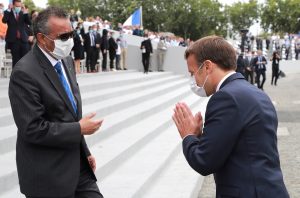
On March 30th, AP’s Maria Cheng reported, “More than 20 heads of government and global agencies called … for an international treaty for pandemic preparedness that they say will protect future generations in the wake of COVID-19.” Cheng added that World Health Organization Director-General Tedros Adhanom Ghebreyesus and several heads of state proposed “a renewed collective commitment” that will provide “a framework for international cooperation and solidarity.”
On the face of it, it is a good idea. In practice, it will lead nowhere. Cheng herself noted that “Although the 25 signatories of the commentary called for ‘solidarity,’ and greater ‘societal commitment,’ there was no indication any country would soon change its own approach to responding to the pandemic.” Moreover, “China, Russia and the United States didn’t join in signing the statement,” she wrote, and White House press secretary Jen Psaki went as far as stating that the treaty “could divert attention away from substantive issues regarding the response, preparedness for future pandemic threats,” effectively sealing its fate before it was born.
Once again, alienation prevents an initiative from succeeding. If every country caters only to its own interests, how will they be able to solve any global problem, especially when they are as widespread as the Covid-19 pandemic? And since they can’t, they are paying the price. Already, Europe is facing a third wave, Brazil is nearing 4,000 Covid fatalities per day, and the US Centers for Disease Control (CDC) director Dr. Rochelle Walensky passionately warned of a fourth wave saying, “Right now, I’m scared …of impending doom.”
We are approaching a tipping point; we will have to choose between solidarity or pain, great pain. Reality has given us an ultimatum, and we must choose whether to stay selfish and suffer, or start thinking of each other. This choice will manifest on every level: international, national, social, and personal. Solidarity is the call of the hour; if we do not heed it voluntarily, it will force itself on us or punish us. Nature has created the virus; nature has created us, and all our innovations will not outsmart nature, our creator.
The future may seem forbidding, but I think that in fact, we should be grateful that we are living through such a transformational period in history. We are transitioning from a self-centered society to a connected humanity. Since we already know the direction, we can choose whether to go there fast and easily, or slow and painfully. How many generations could say that they have a clear path for all of humanity? I think we are lucky, but we should seize the opportunity and ride the wave. We shouldn’t be afraid; there is no need to suffer. We can join hands and build together a world where people care for one another, where there are no pandemics, no wars, and no alienation. The choice is ours; we can take it or leave it.
[French President Emmanuel Macron greets World Health Organization (WHO) Director-General Tedros Adhanom Ghebreyesus at the end of the annual Bastille Day military ceremony on the Place de la Concorde in Paris, July 14, 2020. Ludovic Marin/Pool via REUTERS]